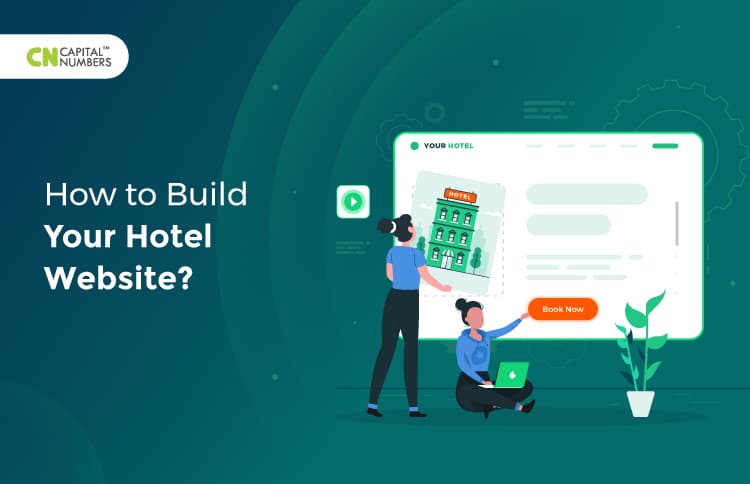How to Build Your Hotel Website?
Table of Contents
Earlier, a guest’s first impression of a hotel wasn’t made until he entered the hotel and walked into the lobby. Today, first impressions start when an individual loads the hotel’s website they’re interested in booking.
For modern-day customers, the desirability of a hotel largely depends on how much they trust the brand. And for that, hotel owners need to create a robust online presence that makes booking decisions easier. If you want to redefine the standards of guest booking experience, here’s how you can create a fully-customized and user-friendly hotel website that’ll ensure you full occupancy round the year:
How to Build Your Hotel Website?
- Choose an Attractive Template
A stunning and clean website template can build a nifty online presence for your hotel. Whether you’re looking to promote your small B&B (Bed and Breakfast), motel, inn, guest house, or beachside resort, a sophisticated template with relevant features can wow your potential guests and stand the test of time.
- Add Relevant Pages
To win more bookings and revenues, your hotel website must contain the most important and relevant pages such as the:
- Home Page – Make sure your homepage has descriptive texts about your hotel. Add appropriate CTAs. Be sure to make it easy for your guests to check room availability.
- About Us Page – Craft a beautiful story about how your hotel was established and what makes it different from the rest.
- Reviews Page – Add reviews in this section and include awards/recognitions to build transparency and trust.
- Contact Us Page – Include phone numbers, emails, social media accounts, contact forms, and even a live chat to help all visitors connect with you and strike up a conversation without delay.
- Organize Images, Videos, and Maps
After choosing your template, incorporate unique images and videos on the website to engage users. However, here’s the catch. Although images are great for capturing customers’ attention, too many images crammed up in one page may slow down your website. So, put one image per web page, making an exception for your gallery, of course! Similarly, videos, too, can increase page load times. Therefore, post them on YouTube and embed the social widget on your website for potential guests to view them.
Often, guests want to get directions to your hotel straight from the website. So, use Google Maps API to help people find your hotel’s exact location and the nearby shops, restaurants, businesses, banks, ATMs, etc.
- Keep Forms Short
Always remember that shorter web forms create less friction. According to HubSpot, cutting form fields from four to three can step up conversions by 25%. As per Clutch, around 44% of people do not spend over two minutes completing a web form. So, never incorporate long forms. Keep essential fields like name, email address, and phone number. This will help people fill out forms quickly and allow you to qualify visitors as prospective leads.
- Choose a User-friendly Booking Engine
Add a user-friendly booking engine to help visitors securely process online reservations. Integrate payment gateways within your website to accelerate direct booking that ultimately leads to enhanced hotel revenues. Make sure that the booking engine plugin that you add is customizable, PCI-compliant, and powerful so that you can manage multiple bookings, upsell services, and create specials to boost guest spend and extended stay.
- Incentivize Your Website
Although it takes planning to incentivize your hotel website and align it with what your guests are looking for, the rewards are entirely worth it. For example, Hilton’s campaign, ‘Stop Clicking Around,’ saw a whopping 90% increase in signups after the hotel chain incentivized direct bookings. Studies also show that around 50% of travelers like a room upgrade as an incentive to direct bookings. So, if you offer discounted room rates, complimentary breakfasts, late checkouts, free parking, spa deals, etc., as direct booking incentives, you can easily encourage repeat customers and drive conversions.
- Be Mobile-ready
A Millennial Media report states that 83% of mobile travelers use smartphones to search hotels and 67% use mobile devices to make online bookings. Moreover, 77% of travelers like to request room service and other hotel facilities through their mobile devices, as per Oracle. What’s clear from these numbers is that hotel websites must be mobile-optimized to attract potential leads. Your mobile-friendly site should cut to the chase, provide customers with essential information, offer fast load times, and help people make online bookings on-the-go.
- Get Social
Third-party solutions like social media icons (e.g., Facebook, Twitter, Instagram, etc.) on your hotel website can help you maximize your reach and build your reputation. Having the right social media presence can always help your business grow like wildflowers. Give your visitors a glimpse of your social media channels directly on your website by integrating live Facebook and Instagram feeds and increase your brand value even wider.
- Update your Site Regularly
If your hotel website takes over three seconds to load, you’ve already lost 53% of mobile users. So, give that outdated page layout a makeover, review pages with low traffic, keep the content unique and fresh, and update your security patches and firewalls from time to time. This will not only improve your SEO ranks but also help you earn your customers’ trust.
Whether you want to start a new hotel website or are looking to revamp the existing one, consider the above points to turn your website visitors into guests in no time.
What do Hotel Owners need to Consider in 2021 and Beyond?
Although COVID-19 has scrambled things up, causing multiple ripple effects in the hospitality pond, experts believe that there is a pent-up demand to take vacations, which will help the industry witness steady growth in the future.
Moreover, Statista states that the hotel industry is likely to reach a market volume of US$ 400 billion by 2025.
Besides, the numbers below show the demand for responsive hotel apps:
Quick Facts:
- 74% of guests use a responsive hotel app if their favorite hotel has one. (Criton)
- 70% of last-minute hotel bookings are made on mobile devices. (Intelity)
Clearly, launching a well-integrated hotel website to deliver a contactless experience can help guests feel secure and convert.
If you are looking to build your hotel website and maximize revenues, contact us.
We’ll leverage an advanced tech stack to create a website that helps you win bookings and propel ahead of the competition.


 Web Development
Web Development Cloud Engineering
Cloud Engineering Mobile App Development
Mobile App Development AI/ML/GenAI
AI/ML/GenAI E-commerce
E-commerce Software Development
Software Development UI/UX
UI/UX QA
QA Dedicated Teams
Dedicated Teams











